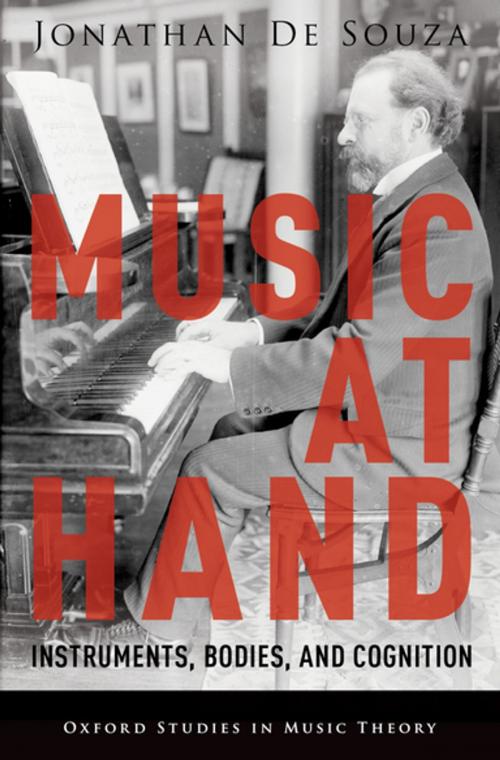Music at Hand
Instruments, Bodies, and Cognition
Nonfiction, Entertainment, Music, Theory & Criticism, Theory| Author: | Jonathan De Souza | ISBN: | 9780190271138 |
| Publisher: | Oxford University Press | Publication: | March 6, 2017 |
| Imprint: | Oxford University Press | Language: | English |
| Author: | Jonathan De Souza |
| ISBN: | 9780190271138 |
| Publisher: | Oxford University Press |
| Publication: | March 6, 2017 |
| Imprint: | Oxford University Press |
| Language: | English |
From prehistoric bone flutes to pipe organs to digital synthesizers, instruments have been important to musical cultures around the world. Yet, how do instruments affect musical organization? And how might they influence players' bodies and minds? Music at Hand explores these questions with a distinctive blend of music theory, psychology, and philosophy. Practicing an instrument, of course, builds bodily habits and skills. But it also develops connections between auditory and motor regions in a player's brain. These multi-sensory links are grounded in particular instrumental interfaces. They reflect the ways that an instrument converts action into sound, and the ways that it coordinates physical and tonal space. Ultimately, these connections can shape listening, improvisation, or composition. This means that pianos, guitars, horns, and bells are not simply tools for making notes. Such technologies, as creative prostheses, also open up possibilities for musical action, perception, and cognition. Throughout the book, author Jonathan De Souza examines diverse musical case studies-from Beethoven to blues harmonica, from Bach to electronic music-introducing novel methods for the analysis of body-instrument interaction. A companion website supports these analytical discussions with audiovisual examples, including motion-capture videos and performances by the author. Written in lucid prose, Music at Hand offers substantive insights for music scholars, while remaining accessible to non-specialist readers. This wide-ranging book will engage music theorists and historians, ethnomusicologists, organologists, composers, and performers-but also psychologists, philosophers, media theorists, and anyone who is curious about how musical experience is embodied and conditioned by technology.
From prehistoric bone flutes to pipe organs to digital synthesizers, instruments have been important to musical cultures around the world. Yet, how do instruments affect musical organization? And how might they influence players' bodies and minds? Music at Hand explores these questions with a distinctive blend of music theory, psychology, and philosophy. Practicing an instrument, of course, builds bodily habits and skills. But it also develops connections between auditory and motor regions in a player's brain. These multi-sensory links are grounded in particular instrumental interfaces. They reflect the ways that an instrument converts action into sound, and the ways that it coordinates physical and tonal space. Ultimately, these connections can shape listening, improvisation, or composition. This means that pianos, guitars, horns, and bells are not simply tools for making notes. Such technologies, as creative prostheses, also open up possibilities for musical action, perception, and cognition. Throughout the book, author Jonathan De Souza examines diverse musical case studies-from Beethoven to blues harmonica, from Bach to electronic music-introducing novel methods for the analysis of body-instrument interaction. A companion website supports these analytical discussions with audiovisual examples, including motion-capture videos and performances by the author. Written in lucid prose, Music at Hand offers substantive insights for music scholars, while remaining accessible to non-specialist readers. This wide-ranging book will engage music theorists and historians, ethnomusicologists, organologists, composers, and performers-but also psychologists, philosophers, media theorists, and anyone who is curious about how musical experience is embodied and conditioned by technology.















